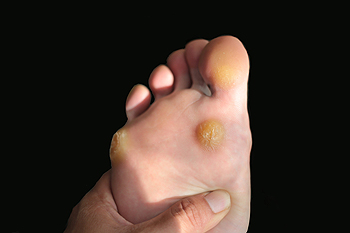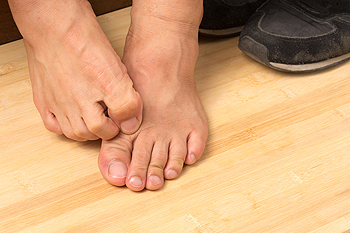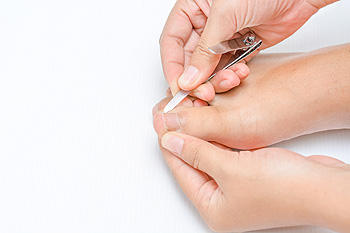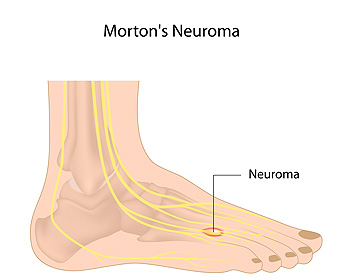June 2020
Does My Child Have an Ingrown Toenail?
 Common symptoms of ingrown toenails are redness and tenderness surrounding the edges of the nail. If your child complains of toenail pain, it may be indicative of an ingrown toenail. Additionally, there may be a discharge oozing if the nail has become infected, and it may cause severe pain and discomfort. This condition can be the result of trimming the toenails improperly, or from wearing shoes that do not have adequate room for the toes to move freely in. It may feel better when your child soaks the affected toe in warm water, as this may help to soften the skin. If you or your child has an ingrown toenail, it is suggested that you consult with a podiatrist who can offer the best treatment options.
Common symptoms of ingrown toenails are redness and tenderness surrounding the edges of the nail. If your child complains of toenail pain, it may be indicative of an ingrown toenail. Additionally, there may be a discharge oozing if the nail has become infected, and it may cause severe pain and discomfort. This condition can be the result of trimming the toenails improperly, or from wearing shoes that do not have adequate room for the toes to move freely in. It may feel better when your child soaks the affected toe in warm water, as this may help to soften the skin. If you or your child has an ingrown toenail, it is suggested that you consult with a podiatrist who can offer the best treatment options.
Ingrown toenails can become painful if they are not treated properly. For more information about ingrown toenails, contact the podiatrists of New England Family Foot Care. Our doctors can provide the care you need to keep you pain-free and on your feet.
Ingrown Toenails
Ingrown toenails occur when a toenail grows sideways into the bed of the nail, causing pain, swelling, and possibly infection.
Causes
- Bacterial infections
- Improper nail cutting such as cutting it too short or not straight across
- Trauma to the toe, such as stubbing, which causes the nail to grow back irregularly
- Ill-fitting shoes that bunch the toes too close together
- Genetic predisposition
Prevention
Because ingrown toenails are not something found outside of shoe-wearing cultures, going barefoot as often as possible will decrease the likeliness of developing ingrown toenails. Wearing proper fitting shoes and using proper cutting techniques will also help decrease your risk of developing ingrown toenails.
Treatment
Ingrown toenails are a very treatable foot condition. In minor cases, soaking the affected area in salt or antibacterial soaps will not only help with the ingrown nail itself, but also help prevent any infections from occurring. In more severe cases, surgery is an option. In either case, speaking to your podiatrist about this condition will help you get a better understanding of specific treatment options that are right for you.
If you have any questions please feel free to contact our office located in Milton, MA . We offer the newest diagnostic and treatment technologies for all your foot and ankle needs.
Plantar Warts Are Caused by a Virus
 Plantar warts develop on the bottom of the feet. They grow into the sole of the foot as pressure is endured from walking during the day, and can cause severe pain and discomfort. They appear as small, hardened areas, and may have black dots in the center. These develop as a result of blood vessels that grow inside the wart. Plantar warts are caused by a virus that lives and thrives in warm and moist environments. These types of places can include public swimming pools, shower room floors, and locker rooms. Patients who have a weakened immune system may be prone to getting plantar warts, in addition to people who have a history of developing this type of wart. It is suggested that you speak to a podiatrist if you have a plantar wart, who can determine what the best course of treatment is for you.
Plantar warts develop on the bottom of the feet. They grow into the sole of the foot as pressure is endured from walking during the day, and can cause severe pain and discomfort. They appear as small, hardened areas, and may have black dots in the center. These develop as a result of blood vessels that grow inside the wart. Plantar warts are caused by a virus that lives and thrives in warm and moist environments. These types of places can include public swimming pools, shower room floors, and locker rooms. Patients who have a weakened immune system may be prone to getting plantar warts, in addition to people who have a history of developing this type of wart. It is suggested that you speak to a podiatrist if you have a plantar wart, who can determine what the best course of treatment is for you.
Plantar warts can be very uncomfortable. If you need your feet checked, contact the podiatrists from New England Family Foot Care. Our doctors will assist you with all of your foot and ankle needs.
About Plantar Warts
Plantar warts are the result of HPV, or human papillomavirus, getting into open wounds on the feet. They are mostly found on the heels or balls of the feet.
While plantar warts are generally harmless, those experiencing excessive pain or those suffering from diabetes or a compromised immune system require immediate medical care. Plantar warts are easily diagnosed, usually through scraping off a bit of rough skin or by getting a biopsy.
Symptoms
- Lesions on the bottom of your feet, usually rough and grainy
- Hard or thick callused spots
- Wart seeds, which are small clotted blood vessels that look like little black spots
- Pain, discomfort, or tenderness of your feet when walking or standing
Treatment
- Freezing
- Electric tool removal
- Laser Treatment
- Topical Creams (prescription only)
- Over-the-counter medications
To help prevent developing plantar warts, avoid walking barefoot over abrasive surfaces that can cause cuts or wounds for HPV to get into. Avoiding direct contact with other warts, as well as not picking or rubbing existing warts, can help prevent the further spread of plantar warts. However, if you think you have developed plantar warts, speak to your podiatrist. He or she can diagnose the warts on your feet and recommend the appropriate treatment options.
If you have any questions please feel free to contact our office located in Milton, MA . We offer the newest diagnostic and treatment technologies for all your foot and ankle needs.
Location of Pain Caused by Morton’s Neuroma
A nerve tissue that has become thickened is referred to as a neuroma. If the tissue that is found between the toes near the ball of the foot becomes inflamed, it is a condition that is known as Morton’s neuroma. It can happen as a result of wearing shoes that are too narrow, or from participating in sporting activities where pressure is placed on the front of the foot. Additionally, it may develop from existing foot deformities that can include flat feet and bunions. A noticeable symptom that patients could have is a burning pain on the sole of the foot, which may travel to the toes. Mild relief may be found when orthotics are worn, and this may give the affected foot the support that is needed as the pressure is reduced. It can be beneficial to avoid wearing high heels, and choosing to wear shoes that are wider in the toe area may be more comfortable. If you have a sharp pain on the bottom of your foot, it is suggested that you speak with a podiatrist who can properly diagnose and treat Morton’s neuroma.
Morton’s neuroma is a very uncomfortable condition to live with. If you think you have Morton’s neuroma, contact the podiatrists of New England Family Foot Care. Our doctors will attend to all of your foot care needs and answer any of your related questions.
Morton’s Neuroma
Morton's neuroma is a painful foot condition that commonly affects the areas between the second and third or third and fourth toe, although other areas of the foot are also susceptible. Morton’s neuroma is caused by an inflamed nerve in the foot that is being squeezed and aggravated by surrounding bones.
What Increases the Chances of Having Morton’s Neuroma?
- Ill-fitting high heels or shoes that add pressure to the toe or foot
- Jogging, running or any sport that involves constant impact to the foot
- Flat feet, bunions, and any other foot deformities
Morton’s neuroma is a very treatable condition. Orthotics and shoe inserts can often be used to alleviate the pain on the forefront of the feet. In more severe cases, corticosteroids can also be prescribed. In order to figure out the best treatment for your neuroma, it’s recommended to seek the care of a podiatrist who can diagnose your condition and provide different treatment options.
If you have any questions, please feel free to contact our office located in Milton, MA . We offer the newest diagnostic and treatment technologies for all your foot care needs.
Plantar Warts Can Be Treated!
How Do You Know If You Have Developed Athlete’s Foot?
 Athlete’s foot is a contagious condition, and as its name suggests, is often common among those who participate in sporting activities. Athlete’s foot can be identified by a few different symptoms. These indicators may include cracking or peeling blisters between the toes, redness and scaling on the soles of the feet, rashes and bumps on the feet, and itchiness. Even though the name is athlete’s foot, this condition can develop for anyone. Not wearing the proper footwear in warm and moist environments can lead to developing athlete's foot, as that is where fungi tend to thrive. These environments can include public swimming pools, communal showers, gyms, and locker room floors. If you believe you have developed athlete’s foot, it is suggested that you seek the help of a podiatrist for proper and professional care.
Athlete’s foot is a contagious condition, and as its name suggests, is often common among those who participate in sporting activities. Athlete’s foot can be identified by a few different symptoms. These indicators may include cracking or peeling blisters between the toes, redness and scaling on the soles of the feet, rashes and bumps on the feet, and itchiness. Even though the name is athlete’s foot, this condition can develop for anyone. Not wearing the proper footwear in warm and moist environments can lead to developing athlete's foot, as that is where fungi tend to thrive. These environments can include public swimming pools, communal showers, gyms, and locker room floors. If you believe you have developed athlete’s foot, it is suggested that you seek the help of a podiatrist for proper and professional care.
Athlete’s Foot
Athlete’s foot is often an uncomfortable condition to experience. Thankfully, podiatrists specialize in treating athlete’s foot and offer the best treatment options. If you have any questions about athlete’s foot, consult with the podiatrists from New England Family Foot Care. Our doctors will assess your condition and provide you with quality treatment.
What Is Athlete’s Foot?
Tinea pedis, more commonly known as athlete’s foot, is a non-serious and common fungal infection of the foot. Athlete’s foot is contagious and can be contracted by touching someone who has it or infected surfaces. The most common places contaminated by it are public showers, locker rooms, and swimming pools. Once contracted, it grows on feet that are left inside moist, dark, and warm shoes and socks.
Prevention
The most effective ways to prevent athlete’s foot include:
- Thoroughly washing and drying feet
- Avoid going barefoot in locker rooms and public showers
- Using shower shoes in public showers
- Wearing socks that allow the feet to breathe
- Changing socks and shoes frequently if you sweat a lot
Symptoms
Athlete’s foot initially occurs as a rash between the toes. However, if left undiagnosed, it can spread to the sides and bottom of the feet, toenails, and if touched by hand, the hands themselves. Symptoms include:
- Redness
- Burning
- Itching
- Scaly and peeling skin
Diagnosis and Treatment
Diagnosis is quick and easy. Skin samples will be taken and either viewed under a microscope or sent to a lab for testing. Sometimes, a podiatrist can diagnose it based on simply looking at it. Once confirmed, treatment options include oral and topical antifungal medications.
If you have any questions, please feel free to contact our office located in Milton, MA . We offer the newest diagnostic and treatment technologies for all your foot care needs.
Proper Foot Care May Prevent Unwanted Foot Conditions
 Research has indicated many people pay little attention to their feet until there is pain and discomfort. This may be prevented by practicing daily foot care habits. These can include stretching the feet, trimming the toenails correctly, and keeping the feet clean. It is beneficial to wear shoes that fit correctly, which may be helpful in preventing unwanted foot conditions from developing. These can consist of ingrown toenails, bunions, blisters, and hammertoe. When the skin becomes dry, it is suggested that a good moisturizer is applied. If you would like additional information about the importance of proper foot care, it is suggested that you schedule a consultation with a podiatrist.
Research has indicated many people pay little attention to their feet until there is pain and discomfort. This may be prevented by practicing daily foot care habits. These can include stretching the feet, trimming the toenails correctly, and keeping the feet clean. It is beneficial to wear shoes that fit correctly, which may be helpful in preventing unwanted foot conditions from developing. These can consist of ingrown toenails, bunions, blisters, and hammertoe. When the skin becomes dry, it is suggested that a good moisturizer is applied. If you would like additional information about the importance of proper foot care, it is suggested that you schedule a consultation with a podiatrist.
Everyday foot care is very important to prevent infection and other foot ailments. If you need your feet checked, contact the podiatrists from New England Family Foot Care. Our doctors can provide the care you need to keep you pain-free and on your feet.
Everyday Foot Care
Often, people take care of their bodies, face and hair more so than they do for their feet. But the feet are a very important aspect of our bodies, and one that we should pay more attention to. Without our feet, we would not be able to perform most daily tasks.
It is best to check your feet regularly to make sure there are no new bruises or cuts that you may not have noticed before. For dry feet, moisturizer can easily be a remedy and can be applied as often as necessary to the affected areas. Wearing shoes that fit well can also help you maintain good foot health, as well as making it easier to walk and do daily activities without the stress or pain of ill-fitting shoes, high heels, or even flip flops. Wearing clean socks with closed shoes is important to ensure that sweat and bacteria do not accumulate within the shoe. Clean socks help to prevent Athlete’s foot, fungi problems, bad odors, and can absorb sweat.
If you have any questions please feel free to contact our office located in Milton, MA . We offer the newest diagnostic and treatment technologies for all your foot and ankle needs.










